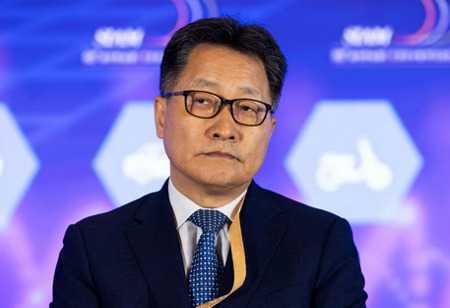
Unsoo Kim Praises GST Cut for Enabling Consumption-Led Economy


According to Hyundai Motor India Managing Director Unsoo Kim, the government has established the groundwork for equitable economic development and a consumer-driven market by lowering taxes on basic necessities.
Speaking at the 65th annual meeting of the Society of Indian Automobile Manufacturers (SIAM), Kim stated that the GST restructuring would provide additional momentum to the automotive industry, working in perfect harmony with the Make in India initiative.
Welcoming the "landmark GST reforms", Kim said, "This historic initiative marks a pivotal step in our collective aspiration to build a Viksit Bharat."
Also Read: Hyundai Motor Shows Small EV Concept to Expand Loniq Lineup
He further said, "By reducing the tax burden on essential goods, the government has laid the foundation for inclusive growth and a consumption-led economy." The GST overhaul will further energise the automotive sector, aligning seamlessly with the Make in India vision, by encouraging domestic manufacturing and stimulating demand across both urban and rural markets, Kim added.
Also Read: Blue Food Revolution: Steering the Waves of Modern Aquaculture
He expressed optimism "about a surge in consumer sentiment during the upcoming festive season, and an overall growth in both short term and long term".
"India is not only one of the largest automotive markets globally, but also a hub of innovation, manufacturing excellence, and unmatched talent," Kim says.
Noting that the global mobility landscape is undergoing a profound transformation, he said, "Across continents, the pursuit of sustainable, clean, and connected transportation ecosystems is reshaping how humanity moves." Electrification, hydrogen propulsion, digital integration, and artificial intelligence are redefining the very essence of mobility.
"The transition to green energy demands significant investment, and the urgency of climate action calls for coordinated, decisive efforts," Kim said.
Kim observed that India is currently experiencing a pivotal phase in its transportation evolution, shifting from being price-focused to being value-oriented while adopting a consumer approach centered on technology, environmental consciousness, and security.
Also Read: How Beijing Turned its Challenges into Opportunity to Win Green Energy Goals
He further mentioned that this change is being driven by forward-thinking governmental initiatives and a collective commitment to creating transportation systems that are accessible, prepared for the future, and ecologically sustainable.
As a cornerstone of economic growth and social development, Kim said, "The automotive industry must rise to this challenge." Asserting that India occupies a unique and strategic position in the global transformation, he said, "Under the Make in India and Atmanirbhar Bharat frameworks, the automotive sector is emerging as a key driver of self-reliance and global competitiveness." Through a synergy of world-class technology and indigenous engineering talent, India is becoming a global hub for innovation and advanced manufacturing, he added.
Kim emphasized the enormous opportunities for partnership and noted that India possesses the magnitude, expertise, and determination to jointly create solutions with international collaborators -- solutions that are produced in India, designed for India, and intended for global use.

